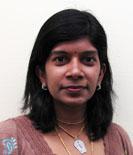Mega Subramaniam, UMaryland – HackHealth
Digital literacy is vitally important in today’s world of technology.
Mega Subramaniam, a professor at the University of Maryland, is pioneering new mythologies aimed at increasing digital literacy.
Mega Subramaniam is currently an Associate Professor at the iSchool – College of Information Studies at the University of Maryland, College Park, MD. She is the Associate Director for the Information Policy and Access Center (iPAC) at the University of Maryland.
She conducts research on the use of school libraries as effective hybrid spaces to encourage science, technology, engineering and mathematics (STEM) interest among undeserved, underrepresented and disadvantaged young adults. Specifically, she is interested in exploring and creating socio-culturally relevant STEM learning environments in school libraries, where the library programs can engage young people in scientific inquiry experiences, make connections to their interests, and facilitate the learning of new media literacy skills needed to be successful in STEM environments. Check-out two learning environments that She has co-designed – HackHealth and Sci-Dentity – where she leverages the strengths of school library programs to stimulate young adults interest in STEM.
She is also interested in examining how to facilitate the learning of new media literacy that is essential for STEM exploration. Currently, She is focusing on specific new media literacy skills: privacy, copyright/remix and credibility of information. Her goal is to extrapolate the new media literacy learning pathways of digitally excluded youth, the challenges they face in acquiring new media literacy, and the pedagogical reforms needed to facilitate new media literacy learning in schools and other environments.
She teaches courses offered through the School Library and the Information and Diverse Populations Specializations. She also serves as the co-editor of School Library Research. Dr. Subramanian lives in Ashton, Maryland, with her husband, Sivam, and my children (Subhatra and Vishvarup). She does not have much free time, but when she does, she enjoys baking for the kids.
HackHealth

After-school programs at libraries serve as safe havens for underserved youth to explore interest-driven activities that can make a lasting impact on their development of digital literacies.
Digital literacy skills and self-efficacy are important drivers in engendering healthy habits among today’s youth. In particular, young people and their respective families from disadvantaged backgrounds are in need of ways to improve their ability to look for, evaluate, and make use of health-related information.
The HackHealth program, conducted by researchers at the College of Information Studies in collaboration with school librarians, addresses the gap between health and digital literacy through an after-school program implemented in five middle schools in the greater Washington D.C. metro area. Participating youth choose a personally relevant health topic (i.e. diabetes management) and work in tandem with school librarians and researchers to improve their health, information, and digital literacy skills. Key skills include 1) how to formulate a search strategy 2) how to assess credibility of online health information, and 3) how to organize research into usable information.
Our findings demonstrate that youth join HackHealth because of a genuine desire to learn, and to maintain and improve health. Further research shows that youth desire to learn about their own and/or family members’ health concerns, such as diabetes, cancer, and HIV/AIDS. Many also endeavor to learn how to prevent or cure health conditions. When asked, youth indicated increased self-efficacy towards cultivating healthy practices and researchers noticed improvements in the youth’s health, information, and digital literacy skills.
Based on these findings, it is clear that encouraging interest-driven activities motivates youth to join after-school programs at libraries and to voluntarily perform personally relevant research tasks otherwise confined to the school day.



